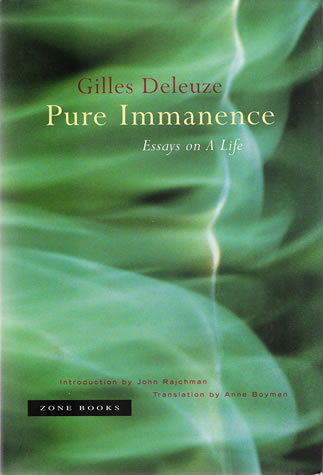 Frame thinking about Deleuze as about a different ontology of and orientation to some notion of transcendence
Frame thinking about Deleuze as about a different ontology of and orientation to some notion of transcendence
- On the one hand, we have a metaphysics of subject and object that can transcend and can be transcended
- Deleuze opposes to this his metaphysics of virtuality, singularity, and event in the plane of immanence
- And it is from this plane that we get the transcendental field, a subject, an object, consciousness, and so on as rhizomatic unfoldings from the field of immanence
- This is where one finds Deleuze’s “transcendental empiricism”
- What is this plane of immanence?
- It is immanent to nothing but itself; it does not belong to a subject or depend on an object
- It is defined A LIFE, with emphasis on the indefinite article
- It is virtual and it is multiple
- We should think of immanence and think of A Life as potentiality, not actuality
- They contain only what Deleuze calls “virtuals:” events, singularities, virtualities
- It is NOT that they lack actuality, but they can only be actualized outside the plane of immanence
- The plane of immanence, Deleuze writes on p. 31, is only ever “actualized in an object or subject to which it attributes itself”
- An object or a subject are thus only ever an effect of actualized potentiality; the immanent field is primary, generating subjects and objects
- A Life: is singularity not individuality
- Like that of the small child
- Note that the child appears in this essay, his last essay, but the figure of the child is also crucial to the essay on Nietzsche, something Deleuze had written decades previously
- It flows under and through THE life that a given subject lives, in which the events and singularities of A life are actualized in subjects and objects; it is potentiality “freed from the accidents of internal and external life, that is, from the subjectivity and objectivity of what happens” (28)
- More than just the moment in between life and death Deleuze finds in Dickens
- It is power, it is bliss (and here see resonances of his Nietzschean “affirmation” and Spinozan “positivity”)
- Like that of the small child
- The plane of immanence, Deleuze writes on p. 31, is only ever “actualized in an object or subject to which it attributes itself”
- Transcendence, then, can only ever be produced by immanence
- Deleuze is careful to distinguish between the transcendental field and the transcendent
- The transcendental field is defined by virtuals and the plane of immanence – it eludes the world of subject and object
- It is NOT defined by consciousness, which is only expressed when reflected onto a subject referring to an object
- The transcendent is composed of actualized virtuals, with reference to subject and object, separate from the plane of immanence
- The transcendental field is defined by virtuals and the plane of immanence – it eludes the world of subject and object
- It is here that Deleuze most explicitly departs from Kant – Deleuze argues that positing some kind of universal subject outside the plane of immanence “de-natures” the transcendental
- Deleuze calls this Kant’s redoubling of the empirical, which distorts immanence by attempting to enclose it within the transcendent
- Deleuze is careful to distinguish between the transcendental field and the transcendent
- Related to this, certainly, is a renunciation of and challenge to Kant’s transcendental ego, and notion of unified subject more broadly
- Instead, with Deleuze we see the transcendental field as a “pure stream of a-subjective consciousness, a pre-reflexive impersonal consciousness, a qualitative duration of consciousness without a self” (25)
- Something metaphysically prior to even the sensations and passions of Hume
- More like quantums or powers of sensation as becoming, or as the passage between sensation; pre-individual affect
- No unified subject
- For Deleuze throughout his work, the identical self is only over an effect or product of difference
- Inversion of traditional metaphysics/ontology Continue reading
- Instead, with Deleuze we see the transcendental field as a “pure stream of a-subjective consciousness, a pre-reflexive impersonal consciousness, a qualitative duration of consciousness without a self” (25)


